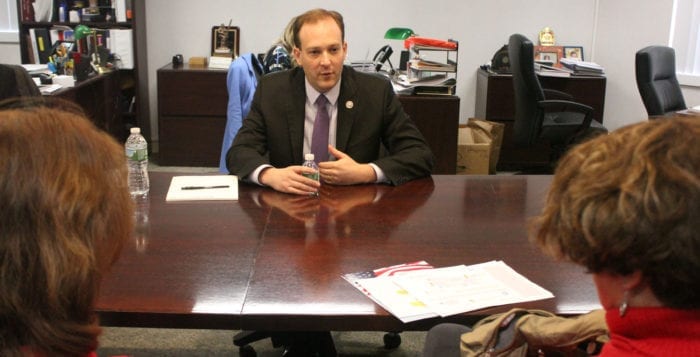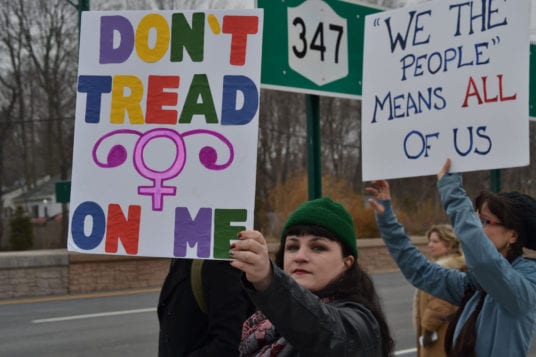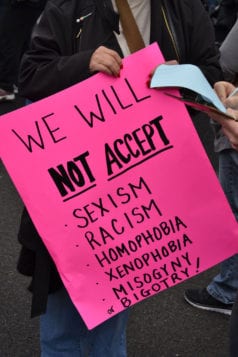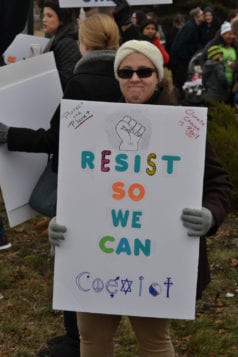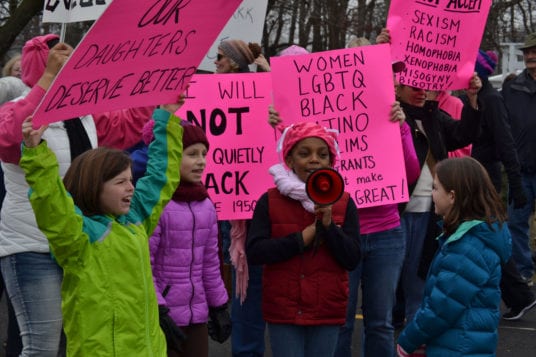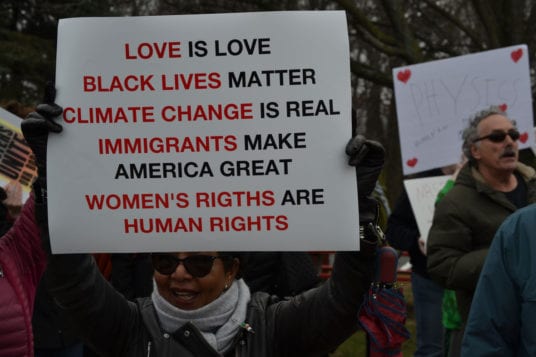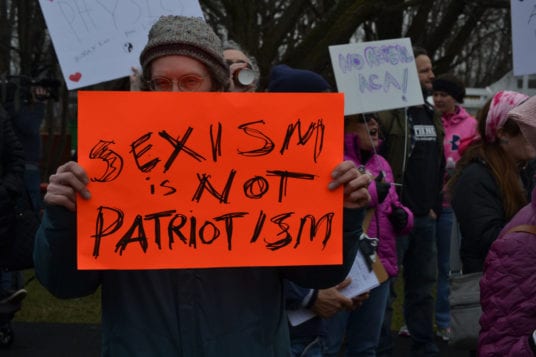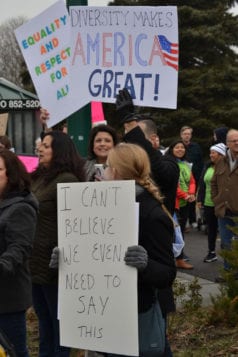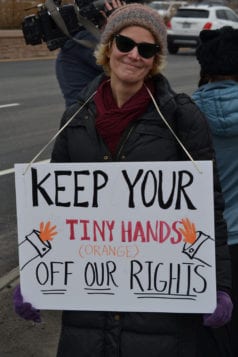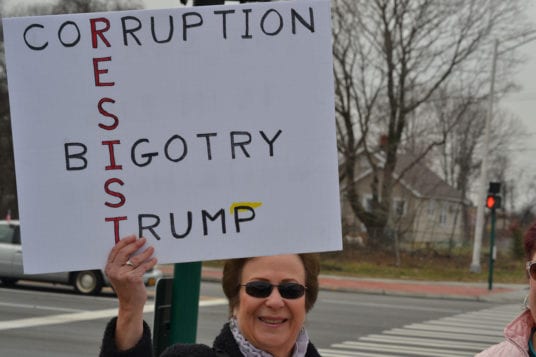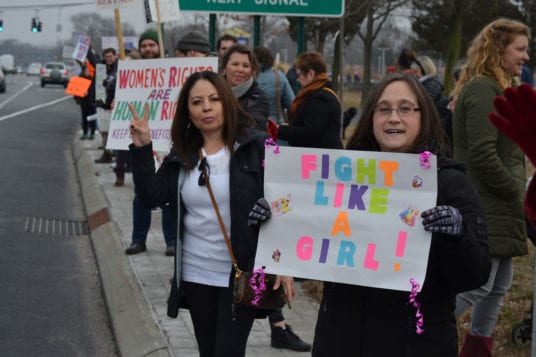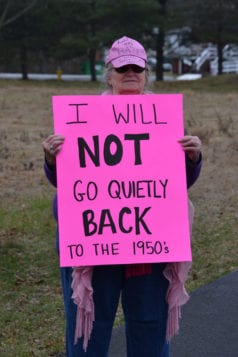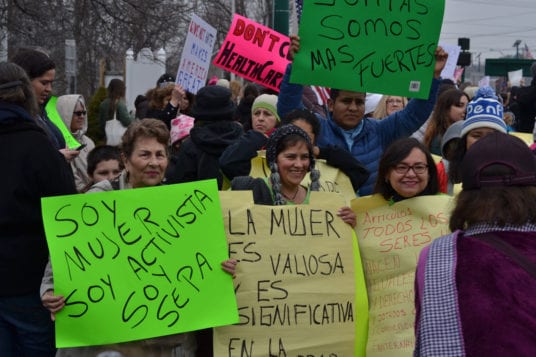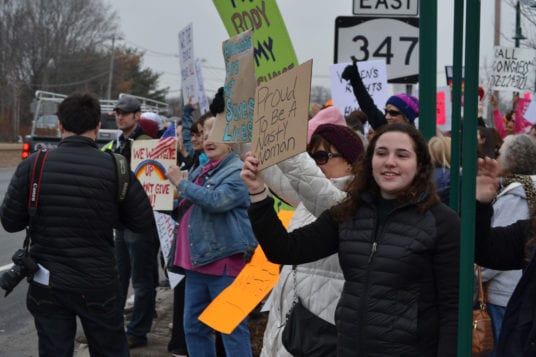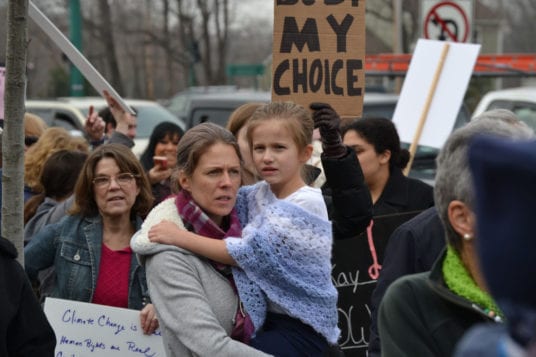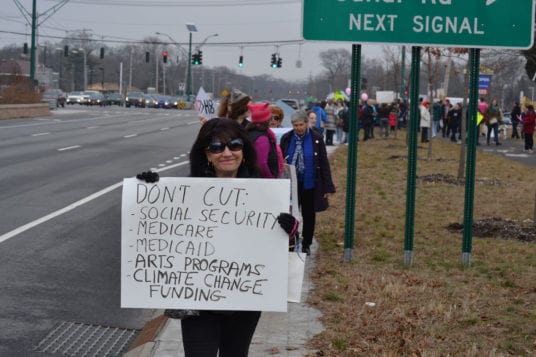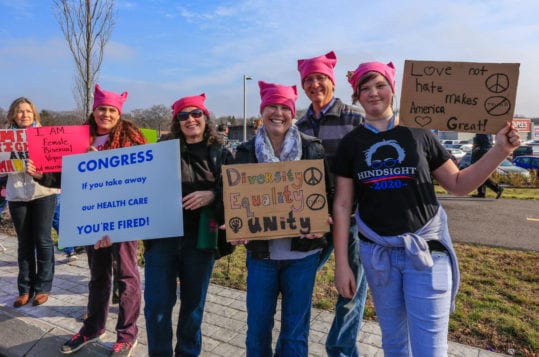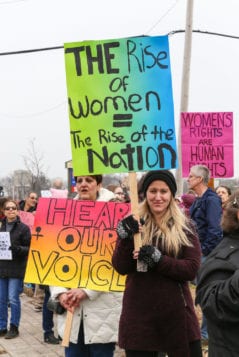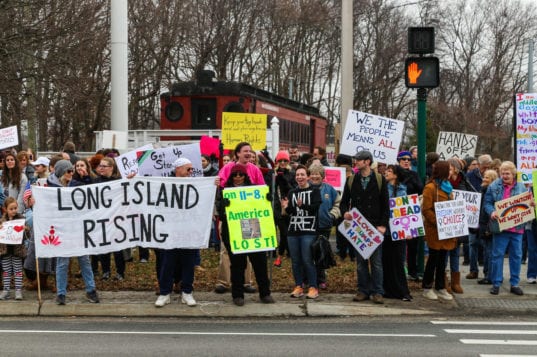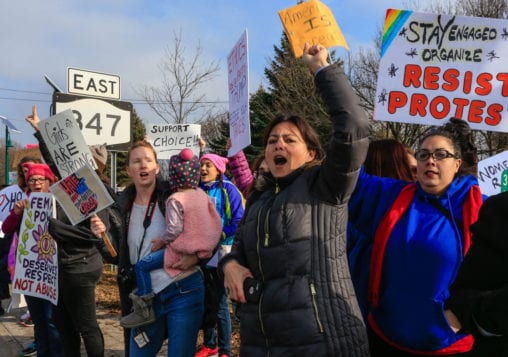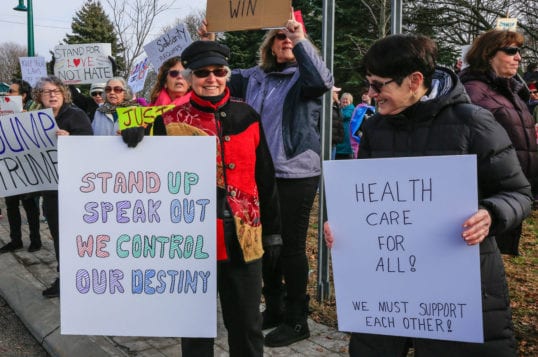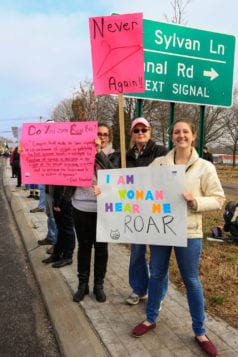By Kevin Redding and Alex Petroski
Hundreds of concerned constituents on both sides of the aisle gathered inside the Hagerman Fire Department in East Patchogue March 3, set up at scattered round tables, waiting to hear their names called to meet with U.S. Rep. Lee Zeldin (R-Shirley).
In another room, the congressman was holding mobile office hours and meeting with five to six people at a time, grouped according to the topics they wanted to discuss, to hear the issues of the people he represents, which ranged from health care and what’s to come of the Affordable Care Act, abortion and the congressman’s stance to defund Planned Parenthood, immigration, the environment, and tax reform.

Despite demands from various local groups to host an in-person town hall in recent weeks, Zeldin has committed to these individualized and small-group meetings to avoid what he’s called the “liberal obstruction” of town halls that have taken place around the United States.
Tehmina Tirmizi, a student at Stony Brook University, said she hoped to talk to Zeldin about the rhetoric of President Donald Trump (R) and his administration, which, she feels, supports bigotry and fear of minorities.
“[They] incite hatred, anger, stress, depression and a lot of people have been hurt and are hurting inside and they should be keeping the peace,” she said. “They can’t just say something, have people react to it and then go and hide somewhere. I’d love to see Zeldin make a statement and come out against [the rhetoric] and he has yet to do that.”
Wading River resident Jim Lupis was there on behalf of a pro-life group to encourage Zeldin to defund Planned Parenthood.
“Taxpayer’s money shouldn’t be used to perform abortions, and murdering innocent children should be totally illegal,” Lupis said. “Zeldin has a strong voting record against Planned Parenthood and I want to speak to him about staying the course and defunding such an evil thing.”
Eastport resident Penny Mintz said, on top of being concerned about Citizens United and “the takeover of the wholesale purchase of government by big corporations,” she wanted to talk about the elimination of consumer protections, environment and healthcare.
“I have no hope of actually speaking to him … I’m only here so that he knows there are all these people who care enough and are watching him, and he can’t abandon us for corporate interests.”
—Penny Mintz
“I have no hope of actually speaking to him … I’m only here so that he knows there are all these people who care enough and are watching him, and he can’t abandon us for corporate interests,” Mintz said. “I wish he would back down from Trump and the policies the president is imposing.”
Just a few tables away, Hampton Bays resident Mark Raschke said he wanted to meet Zeldin, give him support, tell him he voted for him, and let him know he liked the way he supported Trump. Port Jefferson Station resident and military veteran Ed Bednarek wants to know where his congressman feels the country is going to go under the Trump administration, and when “the liberals are going to stop fighting and start getting on board and work with us as a team,” also calling for veterans to take priority over immigrants.
Ira Silverberg, of Bellport, said he wanted to challenge the congressman on a voting record that is “not protecting the environment of Long Island as well as he says it is.”
When asked how he felt about the mobile office hours in comparison to an in-person town hall meeting, Silverberg said “this format has disenfranchised 85 percent of the people who have shown up and is too controlling and inadequate to deal with the needs of the diverse, concerned community.”
For Cindy Morris, from Stony Brook, who wished to speak with Zeldin about the civil liberties she felt had been under attack as of late, she said the mobile office hours format “does not work.”
“We are all just talking amongst ourselves … [Zeldin’s] staff isn’t even circulating and coming out to talk to us,” Morris said. “I look at this room and I see diversity, so this is an opportunity for him to really meet with his constituency and not just meet with the people who pay for him to win elections. We aren’t protesters, we’re passionate citizens.”
Anna Hayward, a Stony Brook University professor, echoed Morris’s feelings.
“In a town hall format, he could hear our issues but we can also hear other people’s issues…we’re a very respectful, educated, and well-mannered community and I don’t think he needs to worry about people screaming at him and attacking him,” she said.

Conversely, Nancy Beltran of Holtsville stands by Zeldin’s decision to not hold such a public forum.
“There’s no risk of chanting and screaming and bullying in a group setting so it avoids all of that, he’s doing the right thing by trying to hear the people without all that noise,” Beltran said.
Outside the fire department, dozens of people — supporters of Zeldin on one side holding up signs that read “Thank You Lee Zeldin for doing what we elected you to do” and opponents of Zeldin on the other with signs that read “Lee Let’s Talk” — stood to voice their concerns.
“I’m very passionate about supporting Lee Zeldin…he’s a stand up guy, he listens to people, educates himself and is not just a go-with-the-political-winds [leader],” Patchogue resident Heather Martwello said.
Mary Casey, who stood in opposition of Zeldin, questioned his moral courage in not wanting to hold a town hall meeting.
“His reported reason is that it just descends into screaming and yelling and it’s useless but I think it’s because he wants to maintain that aura of being right and if you have people screaming at you, you can’t be in control,” she said.
Zeldin’s aversion to holding a traditional in-person town hall has left many in his district angered, despite mobile office hours and an hour-long telephone town hall in February.
A group called Project Free Knowledge hosted an event called The People’s Town Hall March 4 in at the Performing Arts Studio in Port Jefferson, which featured a Zeldin impersonator, repeated potshots at the congressman and a foil called The People’s Candidate. The show was meant to serve as political satire, though one of the organizers behind the production said the group intended to deliver a serious message through the performance.
“… [Lee Zeldin] needs to prescreen people’s questions, he’s incredibly controlling about the conditions in which it happens, and it’s clear he doesn’t want a general town hall with community moderators because he’s not actually prepared to stand accountable for the things that he’s doing.”
—Anna Sitzmann
Anna Sitzmann, a member of the Project Free Knowledge team and a participant in the performance, said the group’s mission was to be both informative to those in attendance while also being critical of Zeldin.
Sitzmann said this was the first time the group has branched out into “political theater,” a phrase she said she’s often heard Zeldin use to describe activist demonstrations. She added the group met with Zeldin about three weeks ago and asked him to host a community-moderated, live town hall, which he declined. Sitzmann said that’s when the group decided to put on their own town hall.
“Zeldin has certainly met with constituents personally, but as we made reference to, he won’t do it for more than half an hour, he needs to prescreen people’s questions, he’s incredibly controlling about the conditions in which it happens, and it’s clear he doesn’t want a general town hall with community moderators because he’s not actually prepared to stand accountable for the things that he’s doing,” Sitzmann said in an interview after the performance. She added Zeldin was invited to attend the event but she received an “unbelievably disrespectful response.”
A spokeswoman for the congressman, Jennifer DiSiena, responded to Sitzmann’s claim in an email, saying she’s not sure what Sitzmann was referring to and called the performance “unbelievably disrespectful.” DiSiena took issue with much of the content of the show.
“Congressman Zeldin will meet with any constituent interested in a productive, substantive exchange of ideas,” she said. “He has even met with the protesters involved in setting up that Mock Town Hall. He is not interested in the type of political theater that this group of liberal obstructionists is interested in promoting. The country faces real challenges and Zeldin will remain focused on working across the aisle to constructively find solutions. Requesting a town hall for the purpose of disrupting the town hall without any sense of decorum or decency is wrong and will not be taken seriously.”
Sitzmann said she’s not concerned about the possibility of the performance adding to an already heated political discourse, which seems to be swallowing whole the district and country alike.
“If I’m stoking the flames of Zeldin’s fire, fine,” she said. “I admit that a lot of people that voted for Lee Zeldin or voted for Donald Trump were upset about things that they ought to have been upset about, but I think the Republican party and especially President Trump have harnessed that anger and misdirected it towards things that don’t deserve the blame, such as minorities and global cooperation, while as a way of hiding the real cause of the problem, which is the kind of economic advantage seeking that both of them partake in.”

